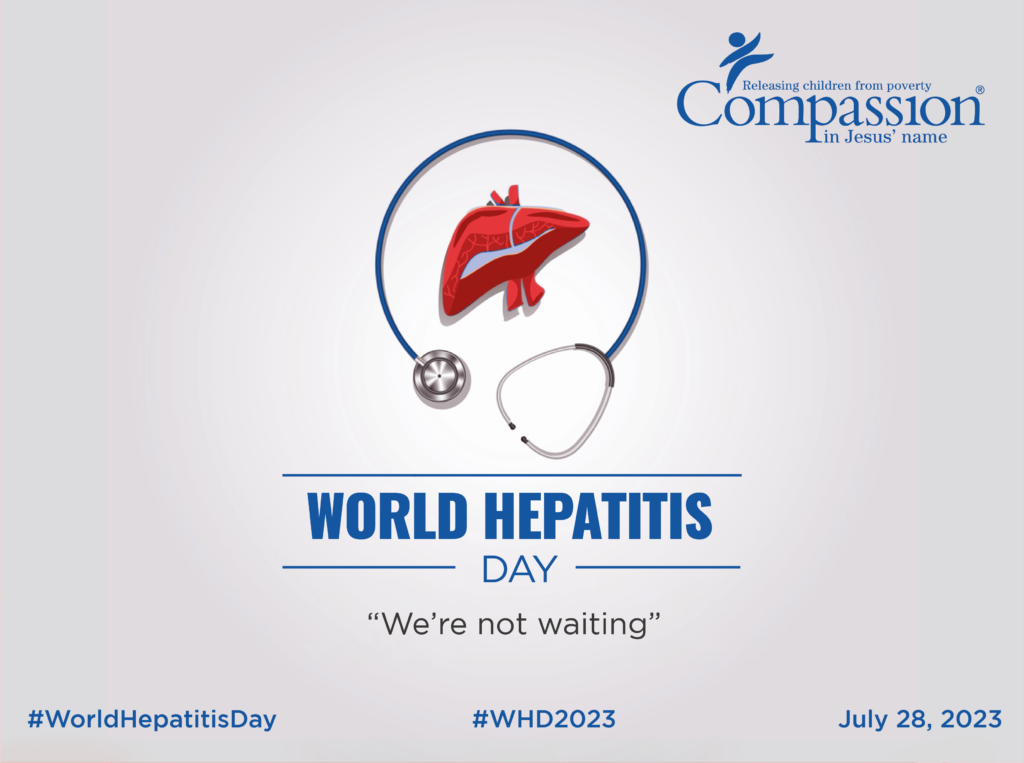
World Hepatitis Day takes places every year on 28 July to raise awareness and promote global action on viral hepatitis. In 2023 the theme is ‘We’re not waiting” calling people around the world to act because Hepatitis Can’t Wait.
Key facts on Hepatitis
Hepatitis refers to the inflammation of the liver. Inflammation is the body’s process of fighting against things that harm it like infections, injuries, and toxins to heal itself.
What causes hepatitis?
Hepatitis can be caused by several health conditions, alcohol consumption and medication. However, the most common cause of hepatitis are viral infections. There are five main viral classifications of hepatitis namely hepatitis A, B, C, D, and E. Each type of hepatitis is caused by a different virus.
How is viral hepatitis spread?
| Type of Hepatitis | How it is spread |
| Hepatitis A | Exposure to Hepatitis A virus in contaminated food or water mostly through faeces from an infected person |
| Hepatitis B | Contact with Hepatitis B virus in body fluids such as blood vaginal secretions or semen. This can be through sharing of sharp objects or having unprotected sex with an infected person |
| Hepatitis C | Contact with Hepatitis C virus in body fluids such as blood, vaginal secretions or semen. This can be through sharing of sharp objects or having unprotected sex with an infected person |
| Hepatitis D | Contact with blood or body fluids contaminated with Hepatitis D virus. Can only be obtained if someone already has Hepatitis B |
| Hepatitis E | Exposure to Hepatitis E virus in food or water mostly through faeces from an infected person. Can also be spread through eating undercooked pork, wild meat or seafood. |
What are the symptoms of Hepatitis?
- Fatigue
- Loss of appetite
- Flu-like symptoms
- Nausea and vomiting
- Diarrhea
- Yellowing of the eyes and skin
- Passing dark colored urine
How is Hepatitis treated?
Hepatitis A and E infections present as a short-term illness and may not require treatment because it resolves on its own. Hepatitis B, C and D treatment requires antiviral drugs which may be taken for several months or years alongside other medications.
How can Hepatitis be prevented?
Hepatitis can mainly be prevented through vaccination and reducing exposure. Vaccines against Hepatitis A and B are available. Vaccination against Hepatitis B also prevents Hepatitis D. There are currently no vaccines against Hepatitis C and E. Practicing effective hygiene is one way to avoid contracting hepatitis A and E. Hepatitis B, C, and D viruses can be transmitted through contact with bodily fluids containing these infectious agents. Therefore, avoiding sharing of needles or other sharp objects is an effective way of prevention. Avoiding sexual contact is also an effective method to prevent spread of Hepatitis B and C.
What is Compassion Kenya doing?
Compassion Kenya (CKE) works with frontline church partners to advocate for vaccination against Hepatitis among high-risk individuals. Through promotion of Christian values that ensure sexual purity and awareness among participants CKE sensitizes on the dangers of the contrary behaviors. Frontline church Partners are continuously empowered to advocate for effective hygiene and sanitation through the various WASH initiatives ongoing in diverse regions. Some traditional practices that expose participants to such infections are discouraged to mention rites of passage, tattooing, ear, and body piercing which increase the risk of transmission. Other preventive measures not limited to sharing of personal items, practicing good hygiene, exercising caution while travelling to places with poor sanitation among other practices are routinely done to ensure maximum prevention of transmission of the Hepatitis virus. Those suspected to have or show symptoms of hepatitis are referred for further screening and treatment. The health team issues advisories in case of an outbreak to increase vigilance among Frontline Church Partners in the affected areas.

